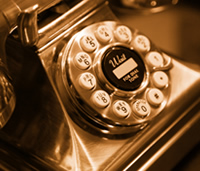Patientline's life in hands of banks
The board of Patientline will gather at the troubled hospital telecoms group's headquarters in Slough for a general meeting.
The meeting is a legal technicality - a result of the fact that net assets are now worth half the called-up share capital - but it will nevertheless be an embarrassing affair for the directors.
Company law requires them to discuss with shareholders "what action, if any, should be taken to deal with this situation".
The reality is that despite the efforts of the current management - turnaround specialists parachuted in after a shareholder revolt - the survival of Patientline is now in the hands of its bankers.
At the height of the 2001 telecoms bubble, Patientline was a stock market darling, as shares soared to more than 200p. But they have since fallen more than 99pc to close yesterday at 0.75p.
The omens were never good: Patientline floated in March 2001 at 175p, just as the dotcom bubble burst. With dealers' screens around the world turning red the shares closed down 8½p on the first day of trading.
Patientline had promised to revolutionise hospital wards.
Its system - the first of which was installed in Northwick Park Hospital, Harrow, in 1995 - not only allowed patients to talk to relatives and watch TV, it also promised to allow staff to read electronic notes at a patient's bedside and enable patients to order food.
Derek Lewis, the ambitious chief executive of Patientline, claimed the system would save lives. The technology, however, was not cheap.
The cost of installing terminals was substantial, at around an estimated £1,400 a bed.
Patientline footed the bill for installing over 72,000 terminals across the UK in return for an exclusive 15-year contract.
But the huge investment - it has run up losses of £100m since floating in March 2001 - has never paid off.
Health trusts failed to adopt electronic records, and its difficulties were compounded by increasing tolerance of mobile phones on wards and shorter hospital stays.
The company tried to recover its investment but an attempt to raise call charges by 160pc sparked a political outcry and it was forced to back down.
A separate decision by Ofcom that a message was played to callers informing them of the maximum potential cost of their calls caused further damage.
Patientline sought compensation from the NHS, but failed because agreements had been made with individual trusts.
Today, the loss making group has around £80m of debt, revenues continue to fall and Patientline's auditors have raised "significant doubts" over the its ability to continue as a going concern.
A restructuring of debt is the priority, but as non- executive chairman Geoff White said: "It is uncertain as to whether any value will be attributable to the ordinary shares in the restructuring."
The prognosis for Patientline's shareholders doesn't look good.

Need a Gold Number?
We have a fantastic selection of memorable gold numbers including 03, 0345, 0370, 0800, 0844 and more.
Our Networks
Please Note - To ensure ITC provide our valued customers with the highest levels of service our minimum call threshold per client is 5,000 call minutes per month.



